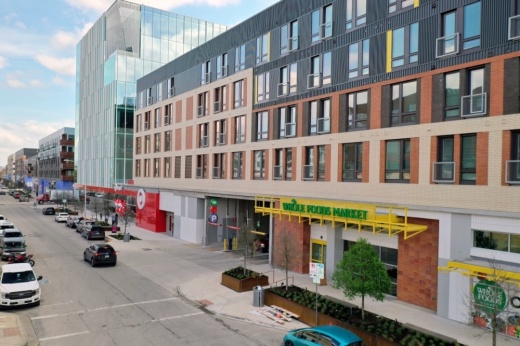Austin leaders and transportation planners said they are looking to ensure development along future Project Connect transit routes takes place equitably, and City Council is preparing to approve a new policy framework aimed at managing such growth.
An equitable transit-oriented development, or ETOD, framework for Austin is nearing a council vote this month that could end up guiding much of the new development that is already occurring along future Project Connect bus and rail lines. The Capital Metro-backed plan is targeted at equitable planning for those who end up living and working around the transit network.
Community and land-use planning linked to transit has been ongoing in the city since the 2000s, and three TOD districts have since set related regulatory standards. Those areas, based around CapMetro's Plaza Saltillo, MLK and Crestview stations, have each seen significant development over recent years.
Six additional districts were previously identified for similar efforts, and CapMetro has also received millions in federal funds to explore the topic alongside Project Connect's development.
The next round of transit-oriented development review could kick off a more extensive planning effort for years to come. CapMetro's draft ETOD policy plan includes well over 100 planning areas for both the transit agency and the city to study without immediately changing any existing land-use standards.
“It’s basically a plan for how to plan in the future,” Warner Cook, a planner with Austin's Housing and Planning Department, told City Council on Feb. 21. "This is really a guiding framework, but not a regulatory piece of work at this point. The focus is really to support residents of all incomes and backgrounds, especially those that have been disproportionately burdened by previous city and other land use and transportation decisions.”
The draft ETOD framework may be viewed here. An interactive planning map may be viewed here.
The new policy outline is coming back under council review nearly two years after officials directed city staff to work with CapMetro on ETOD planning along Austin's future transit network. With a potential plan now in place, District 1 Council Member Natasha Harper-Madison said upcoming decisions by the community and council could maximize the “historic” multibillion-dollar investment of Project Connect.
“If we get this right ... we could do so much good for so many generations. If we get it wrong, it will be a great addition to the many binders of great plans that are stacked on our bookshelves as we speak. So I really want to get this one right,” Harper-Madison said.
If council approves the framework in March, Cook said the regulatory process will first include initiating amendments to Austin's land development code to highlight ETOD planning areas. The consideration of interim and final ETOD regulations would follow. City planners have based the initial policy draft around six top goals that would likely guide any code adjustments. Those include:
- Ensuring residents can benefit from local transportation;
- Closing racial health and wealth gaps;
- Both preserving and expanding affordable housing;
- Growing community career opportunities;
- Promoting healthy residential, commercial and public uses; and
- Supporting legacy and minority-owned businesses.
Community members interested in weighing in on the future of Austin's ETOD efforts can provide feedback during several CapMetro-hosted virtual workshops this week. Sessions on the North Lamar Transit Center are scheduled for Feb. 28 at noon and 6:30 p.m., while South Congress Transit Center sessions are scheduled for March 1 at noon and 6:30 p.m. City officials will be discussing the ETOD policy during a joint committee meeting March 2 at 1 p.m. with a final vote on the framework set on council's March 9 meeting agenda.





